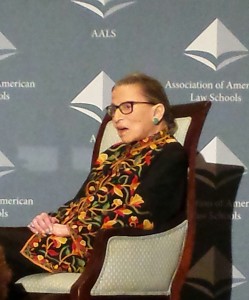Conferences Focuses on Fighting Human Trafficking and Repairing the Harm to Victims
“I want to believe that this can end,” Sharmere McKenzie said. “Let’s do this together. Let’s do this together. Are you with me?”
Yes, a capacity audience in the Appellate Courtroom of Eckstein Hall was with her. That was because of far more than the riveting personal stories told by McKenzie and several others at a day-long conference, “Restorative Justice and Human Trafficking – from Wisconsin to the World.”
The people at the conference were with McKenzie because of their commitment to dealing with the entirety of the issue of human trafficking, starting with understanding the realities of it and expanding to include prevention, prosecution, and repair of the lives of those who are victimized by it.
The emphasis at the conference was particularly on the “restorative justice” aspects of responding to trafficking. Janine Geske, a retired professor at Marquette Law School, continues to be a central figure in restorative justice work at the Law School and far beyond. She led the conference and set the tone of focusing on what harm is done by human trafficking and what can be done to repair the harm.

